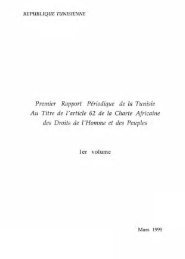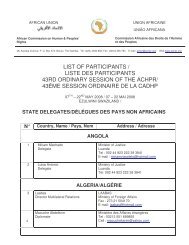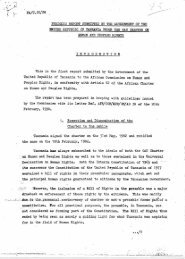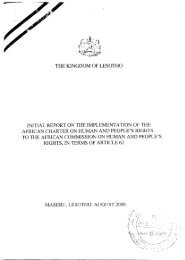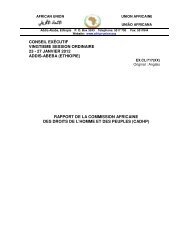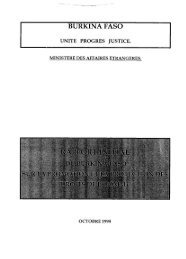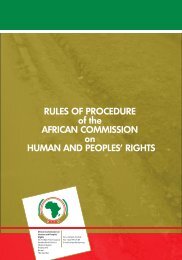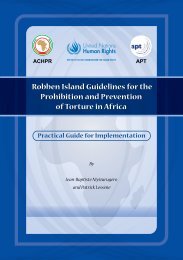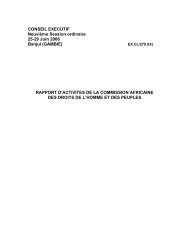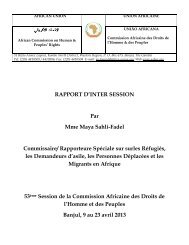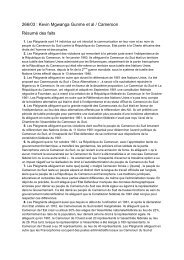307/05 : Obert Chinhamo / Zimbabwe Summary of Facts - African ...
307/05 : Obert Chinhamo / Zimbabwe Summary of Facts - African ...
307/05 : Obert Chinhamo / Zimbabwe Summary of Facts - African ...
You also want an ePaper? Increase the reach of your titles
YUMPU automatically turns print PDFs into web optimized ePapers that Google loves.
the Commission, the Complainant has not substantiated his allegations with facts. Even if, forexample, the detention <strong>of</strong> the Complainant amounted to psychological torture, it could not have beenlife-threatening to cause the Complainant flee for his life. Apart from the alleged inhumane conditionsunder which he was held, there is no indication <strong>of</strong> physical abuse like in theShumba and Wiwa cases.Torture could not have been the cause for the Complainant’s fleeing the country because the allegedinhumane and degrading or torturous treatment occurred in August/September 2004, and theComplainant remained in the country until January 20<strong>05</strong>, and even made court appearances on atleast four occasions to answer charges brought against him. The alleged intimidation and threat to theComplainant’s life occurred between August and October 2004. This means that by the time theComplainant left for South Africa in January 20<strong>05</strong>, the alleged threats and intimidation had ceased.There is therefore no evidence to prove that his leaving the Respondent State was as a result <strong>of</strong> fearfor his life occasioned by threats and intimidation, or that even if he was threatened and intimidated,this could be attributed to the Respondent State.76. The Complainant has simply made general allegations and has not corroborated his allegationswith documentary evidence or testimonies <strong>of</strong> others. He has not shown, like in the other casesmentioned above, the danger he found himself in that necessitated his fleeing the country. Withoutconcrete evidence to support the allegations made by the Complainant, the Commission cannot holdthe Respondent State responsible for whatever harassment, intimidation and threats that theComplainant alleges he suffered, that made him flee the country for his life. This is even so because[the] Complainant never bothered to report these incidences to the police or raise them with themagistrate when he appeared four times in the Respondent[‘s] court. If the intimidation and threatswere not brought to the attention <strong>of</strong> the State for investigation, and if the State was not in a position toknow about them, it would be inappropriate to hold the State responsible.77. Having said that, the question is, could the Complainant still have exhausted local remedies orbetter still, is he required to exhaust local remedies, even outside the Respondent State?.78. The first test that a local remedy must pass is that it must be available to be exhausted. Theword “available” means “readily obtainable; accessible” 10 ; or “attainable, reachable; on call, on hand,ready, present; . . . convenient, at one’s service, at one’s command, at one’s disposal, at one’s beckand call.” 1179. According to this Commission, a remedy is considered to be available if the petitioner can pursueit without impediments or if he can make use <strong>of</strong> it in the circumstances <strong>of</strong> his case. 12 Were thereremedies available to the Complainant even from outside the Respondent State?80. The State indicates that in terms <strong>of</strong> its laws, a Complainant need not be physically present in thecountry in order to access local remedies, adding that both the High Court Act and the Supreme CourtAct permit any person to make an application to either court through his/her lawyer. In support <strong>of</strong> this,the State cites the Ray Choto and Mark Chavhunduka Case where the victims were tortured by Stateagents, and they applied for compensation while they were both in the United Kingdom andsucceeded in their claim. The State concluded that the Complainant is not barred from pursuingremedies in a similar manner.81. The Complainant does not dispute the availability <strong>of</strong> local remedies in the Respondent State, butargues that in his particular case, having fled the country for fear <strong>of</strong> his life, and now out <strong>of</strong> the country,local remedies are not available to him.82. This Commission holds the view that having failed to establish that he left the countryinvoluntarily due to the acts <strong>of</strong> the Respondent State, and in view <strong>of</strong> the fact that under <strong>Zimbabwe</strong> law,one need not be physically in the country to access local remedies; the Complainant cannot claim thatlocal remedies are not available to him.83. The Complainant argues that even if local remedies were available, they were not effectivebecause the State has the tendency <strong>of</strong> ignoring court rulings taken against it, citing among others theHigh Court decision in the Commercial Farmers Union Case and the Ray Choto and MarkChavhunduka case, and added that the <strong>Zimbabwe</strong> Lawyers for Human Rights has documented atleast 12 instances where the State has ignored court rulings since 2000.84. It is not enough for a Complainant to simply conclude that because the State failed to complywith a court decision in one instance, it will do the same in their own case. Each case must be treated



